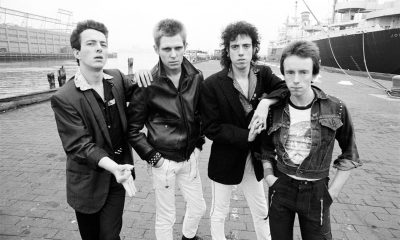Album Reviews
Album Review: Bill Callahan – Apocalypse
In “America!” Bill Callahan lays out some of his main influences over a lite-porn guitar riff: “Captain Kristofferson, Buck Sergeant Newbury, Leatherneck Jones, Sergeant Cash… what an army!” It’s hard to tell if he’s genuinely and playfully extolling his heroes or taking the piss out of the reverence these men regularly receive. Especially against the dinner theater swagger of the music, the ambiguity is more frustrating than fascinating, which makes listening to “America!” like spotting a chupacabra or capturing Bigfoot on film: A truly irredeemable Bill Callahan song is indeed a mythological creature.
Usually, Callahan thrives on such ambiguities, writing lyrics that rarely give up their meaning on first—or tenth, or one-hundredth—listen. Delivered in his deep, disarming voice, those turns of phrase stick in your head for days, like logic puzzles of zen koans, but there is almost always some kernel of hard-won wisdom to be found in his gently ornate country-folk songs. On Apocalypse, his third album after retiring the mysterious Smog moniker, his music has grown even more minimalist and subdued; the album’s sonic hallmark is the flute, which illuminates “Universal Applicant” with a slight Aaron Copeland fanfare.
Apocalypse sounds as if every instrument has been calibrated to bolster Callahan’s mighty vocals and enigmatic lyrics. With its spidery arrangement, “Baby’s Breath” is all feints and fakeouts: “There grows a weed, looks like a flower, looks like baby’s breath on a mirror,” he sings at the beginning, creating what seems at first like a benign image. However, that line grows darker when you remember that people once used mirrors to tell if someone is actually breathing and alive.
“My lover and I rushed atop the altar,” he sings later, suggesting some hasty romantic union, but then he veers into a new direction: “The ultimate sacrifice was made.” Dead babies and human sacrifice: “Baby’s Breath” circles in on itself constantly, evading any attempt to pin it down and make it mean something concrete. It’s mercurial and unsettled and impossible to shake, even if you never quite grasp the tragedy at its core.
Callahan is not always so evasive, but he is rarely anything but eloquent: “Drover” is the relatively straightforward tale of a cattle rancher watching over his herds, and while it’s tempting to read into it some allegory—about touring, about making music, about a relationship—the song seems to dispel any subtext. In fact, there is a quality to these tales that recalls the hardscrabble characters of Cormac McCArthy, and Callahan inhabits them with no evidence of strain. Most of them, in fact, come across as variations on himself—or at least the version of himself he plays in “Riding for the Feeling.” Holed up in a hotel room in some nameless American city, presumably between tour stops, he spreads his demos around him on the bed, watches the TV on mute, and declares it his apocalypse.
He revisits that moment on closer “One Fine Morning,” as if he’s remembering the previous song, as if the songs are all blending together in his memory. “It’s all coming back to me now… my apocalypse.” The implication is clear: To create is simply to destroy.
- Lists13 years ago
Top 10 Country Music Albums of 2010

 Interviews5 years ago
Interviews5 years agoJohn Rich – The Interview

 Song Reviews16 years ago
Song Reviews16 years agoTaylor Swift – “Love Story”

 Interviews5 years ago
Interviews5 years agoHoneyhoney on Hiatus: Revisit our 2008 Interview with Suzanne Santo

 Album Reviews14 years ago
Album Reviews14 years agoAlbum Review: Miley Cyrus – Can’t Be Tamed

 Song Reviews6 years ago
Song Reviews6 years agoThe Band Perry – “Hip To My Heart”

 Columns5 years ago
Columns5 years agoThe Link Between Folk Music’s Past and Present

 Columns5 years ago
Columns5 years agoIs Marketing Killing Rock and Roll?

